Westley Richard’s L.D. McCaa II: How to Build a Quality Collection of Shotguns
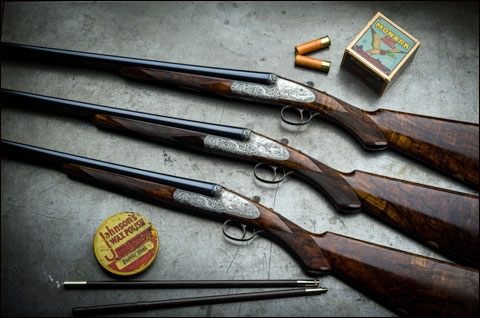
If you’re of the mind to start a quality shotgun collection, here’s one essential tip you need to know: understand the difference between a shotgun salesman and a consultant.
A salesman will sell you a shotgun that may not be in your best interest to own. A consultant should advise you on the best way to build your collection by identifying high-quality guns that are fairly priced, have investment potential, and satisfy the objectives and vision of your collection.
“I try to help customers spend their money in the wisest way,” explained L.D. McCaa II, Director of Westley Richards in Gulf Breeze, Florida. “As a consultant I’m basically helping collectors from making common mistakes. I’m helping them be a smart collector. If you don’t collect every day, it’s difficult to learn the true value of a gun, especially if you’re paying investment prices.”
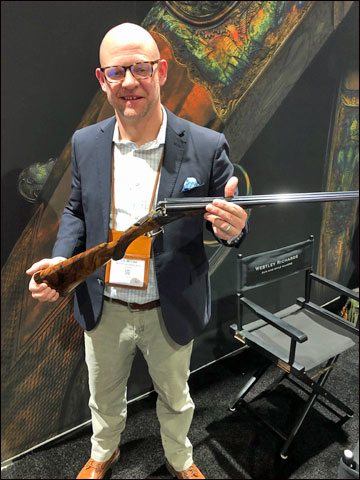 L.D. McCaa II shows a Westley Richard shotgun in their exhibit at the 2020 Safari Club International Convention.
L.D. McCaa II shows a Westley Richard shotgun in their exhibit at the 2020 Safari Club International Convention.It’s been a little-known fact that English best-gunmaker Westley Richards actually sells used shotguns and rifles. For Mr. McCaa, his trans-Atlantic connection with Westley Richards began when he befriended Simon Clode, the late Chairman and Managing Director of Westley Richards in Birmingham, England. The relationship dated back to the late 1990s when Mr. McCaa was brokering Westley Richards preowned guns through his family’s business, Gulf Breeze Firearms in Gulf Breeze, Florida. At the time, Westley Richards’ American agent was based in Springfield, Missouri but later moved to Bozeman, Montana.
Mr. Clode, already diagnosed with terminal cancer, wanted more than a representative in the U.S.; he was looking to establish a full retail presence. With Gulf Breeze Firearms in business since 1986, Mr. McCaa and his father Duke had over 20 years built a loyal customer base of affluent sportsmen.
Mr. McCaa’s father had actually met Mr. Clode in about 2008 and a friendship ensued. By 2014, Mr. McCaa started brokering shotguns and rifles for Mr. Clode to the customers of Gulf Breeze Firearms. It was two years later, with Mr. Clode’s cancer diagnosis, that Mr. McCaa made the leap to work for England-based Westley Richards while his father took over management of Gulf Breeze Firearms. He relocated the Westley Richards inventory from Bozeman to a retail space next door to Gulf Breeze Firearms.
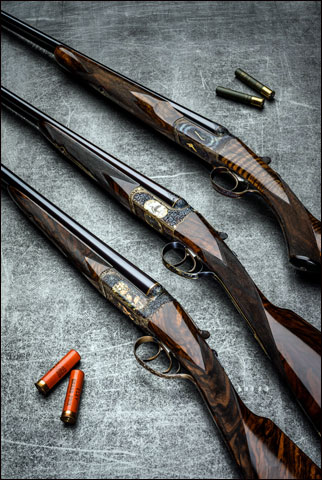 A used Purdey shotgun available from Westley Richards.
A used Purdey shotgun available from Westley Richards.“We’re two distinct businesses that serve similar but different markets and we just happen to be next door to each other,” Mr. McCaa explained.
But Westley Richards and Gulf Breeze shared a common approach to selling fine guns.
“Quality over quantity was always Simon’s strategy for second-hand guns,” explained Mr. McCaa, “and it’s been ours as well at Gulf Breeze. That’s the segue of how I came to Westley Richards. Simon often sold high-end guns quietly from one high end collector to another. They were quiet sales, low key and discrete. Simon never wanted to have a big inventory of second-hand guns. My primary focus here in the U.S., aside from finding new customers and serving existing ones, is dealing in second-hand guns.”
Now in his mid-forties, Mr. McCaa has been in the fine gun business most of his adult life by starting in his father’s business.
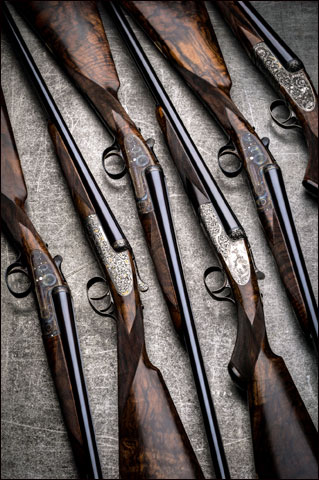 Westley Richards sidelock shotguns.
Westley Richards sidelock shotguns.Mr. McCaa’s customers work in virtually all different types of businesses – from Wall Street tycoons to Louisiana wildcatters. Regardless, they share a passion for fine shotguns and rifles.
“My customers look to me to help them build their collections,” he said. “I’m part art dealer and part fund manager. I sell luxury items that are just like fine art, fine watches and fine cars.”
For new collectors of shotguns, budget is always a logical starting point.
“Once we know the threshold of what they can spend we find out what their goals are and help them find the best guns,” explained Mr. McCaa. “Everybody has their own strategy for collecting, but a strategy can change with the market and the opportunity.”
Your collecting strategy should actually start with some self-analysis.
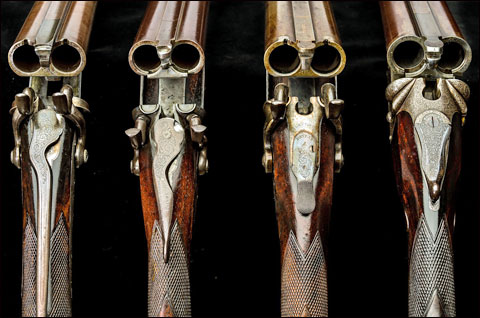 A quartet of used side-by-side shotguns in the Westley Richards inventory.
A quartet of used side-by-side shotguns in the Westley Richards inventory.“There’s two different types of collectors,” he explained. “There’s the focused, single-marque collector who knows everything about them. He loves being the smart guy and knowing about those guns. Part of the love affair of collecting is his knowledge. The other type of collector wants a nice high-end gun collection who doesn’t have the time to read all the books and spend time on the Internet. But if you’re going to be a quintessential collector you need to have the core guns that made the marque successful.”
During our phone call, Mr. McCaa pointed out that only a few features make up a shotgun’s configuration and they can have a big impact on resale value. In the most basic consideration, you have the barrels, receiver, action and wood.
Mr. McCaa shared some advice on what individual shotgun collectors, regardless of price or marque, should consider before purchasing a gun:
- Does the gun perform its most basic function safely and reliably?
- What is the configuration? For starters, you consider the bore size/gauge, sidelock or a boxlock, barrel length, shape is the grip and the stock dimensions.
- Just like in real estate where location is the most important aspect to determine its value, in fine guns it’s condition, condition, condition. The closer a gun is to its original condition, generally speaking, the better the chances are for a higher resale value over a gun that’s been refinished, used hard or not cared for. Few things can raise the value on a gun like high original condition.
- How close to original is the gun I’m looking at? Whether it’s English guns that were routinely serviced and refinished where necessary or American-made guns where refinishing can devalue by more than 50%, the closer a gun is to its original factory condition and configuration the more valuable that gun will be.
- Is the price in line with the comparable guns in this current market?
- Is the price appropriate for the gun in its given condition?
- Am I paying for something that doesn’t apply to my needs?
- When you’re talking about proofing, the first thing you’re talking about is an English gun. Are the barrels in proof and what are the walls thickness?
- Do the barrels open and close properly?
- What is the length of the barrels? For instance, in selling shotguns of almost any type, there is an aversion to barrels shorter than 28 inches.
- Are the barrels safe?
- Are there dents or bulges in the barrels?
- Is there pitting in the bores?
- Are there any cracks in the stock?
- Is the gun in original proof?
- Does the gun have original color on the action and how much?
- Is the black on the barrels original and how much remains?
- Is the engraving sharp?
- Are the stock and forend original and how much original finish remains?
- Are there any signs of repaired cracks, raised or hammered out dents in the barrels or other repairs? Has the gun been refinished, restocked or show some other obvious non-original alteration?
- Does the gun have its original case?
- Do the pins (screws) remain timed or are they out of time and buggered?
- What is the quality of the materials?
- Measure the barrels to know their chamber length, bore diameter and minimum wall thickness. This simply cannot be done with the naked eye,
- How original is the gun?
- Judge each gun unto itself. Don’t assume things about the gun based on marque. What’s the condition of the barrels?
- Is the gun mechanically and structurally sound? Do the ejectors work? If it has a single trigger, is it reliable or has the trigger been tampered with?
- The configuration should fit the gun’s purpose when it comes to barrel length, stock length, chokes, gauge and stock shape.
- Condition is the most important thing.
- Consider the historical value.
- Rarity never equals demand. That’s a pitfall customers can fall into. Because an English gun is rare doesn’t mean it elevates the value of the gun – it could hurt it – depending on what niche the gun falls into.
- Just because a gun is old, doesn’t make it valuable.
When it comes to starting a shotgun collection, Mr. McCaa advised:
- Have a strategy.
- A collector might want to start at a lower financial threshold, let’s say starting with Remington’s instead of Westley Richards.
- Buy what you like.
- What do you like to do with your guns? Hunting?
- Some guns will have more value to some people than others.
- The value of a single piece can be enhanced by being in a certain collection. That piece becomes more valuable as floated by their peers in the collection. Plus, a gun can boost up the entire collection.
- The gun’s value also depends on the merits of the collection it’s going into.
- Find guns that made the gunmaker famous.
Ultimately, though, Mr. McCaa counseled “collect what you like. The best advice for fine guns as investments is don’t buy guns for investments.”
Irwin Greenstein is the publisher of Shotgun Life. You can reach him at contact@shotgunlife.com.
Useful resources:

Irwin Greenstein is Publisher of Shotgun Life. Please send your comments to letters@shotgunlife.com.


Comments